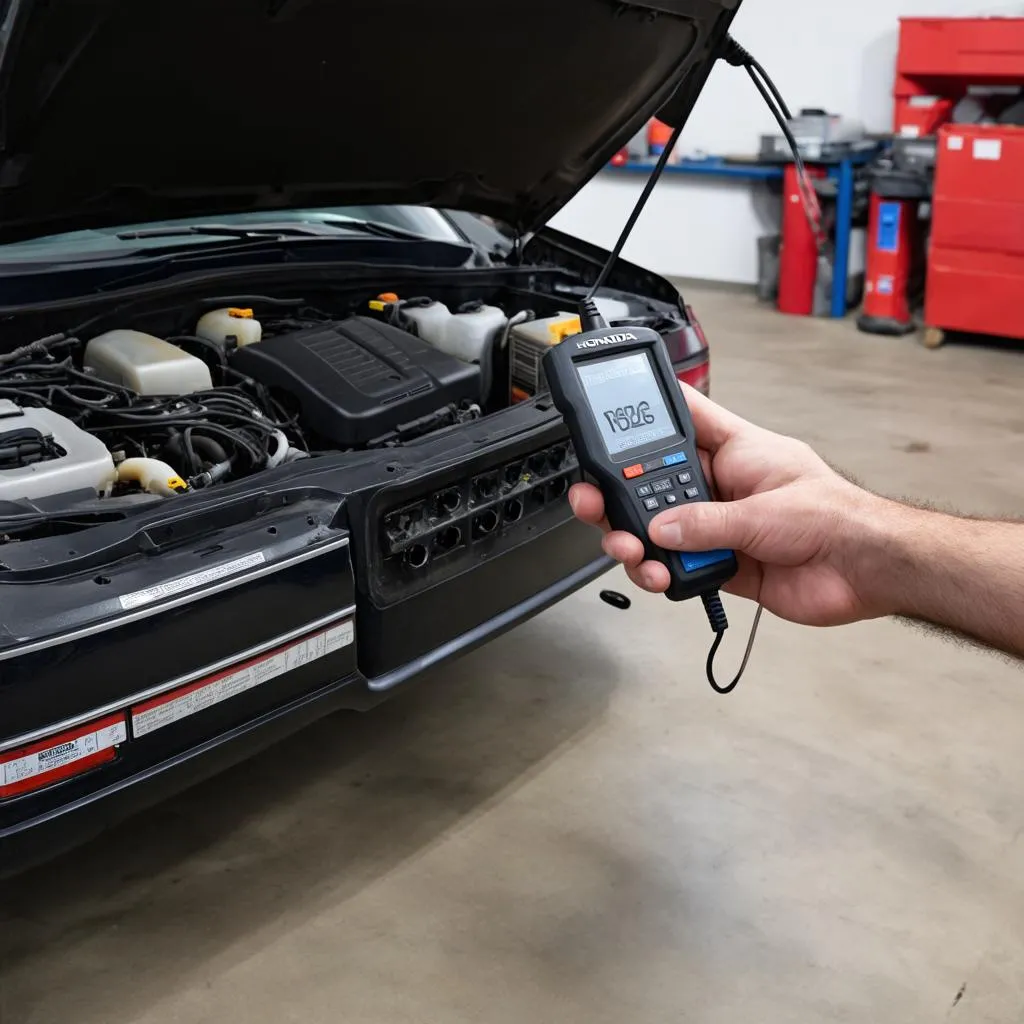Imagine this: you’re cruising down the highway, the open road stretching before you like a ribbon of asphalt. Suddenly, that dreaded “Check Engine” light illuminates your dashboard, casting an unwelcome glow on your otherwise perfect journey. Your mind races – what could it be? A faulty sensor? Loose gas cap? Or something more serious? Thankfully, your car speaks to you, not through cryptic whispers, but through the On-Board Diagnostics system, more commonly known as OBD2. This little port holds the key to understanding your car’s woes, especially on models like the trusty 2004 Honda Accord. But what happens when the OBD2 system itself needs attention? Let’s dive into the world of OBD2, specifically focusing on the 2004 Honda Accord, and explore what it means to “change the OBDs.”
Understanding the Heart of Your Honda: The OBD2 System
Before we talk about changing anything, let’s understand what we’re dealing with. The OBD2 port on your 2004 Honda Accord is like your car’s data port, a direct line to its inner workings. It allows mechanics and DIY enthusiasts to connect a scan tool, often called an OBD2 scanner, to retrieve diagnostic information. This information comes in the form of Diagnostic Trouble Codes (DTCs) – those cryptic codes that indicate what’s going on with your engine, transmission, emissions system, and more.
“Changing the OBDs” isn’t really about swapping out the entire system. Instead, it usually refers to one of two things:
-
Replacing the OBD2 Port: While uncommon, the physical port itself can get damaged. This might require a replacement, which is a relatively simple procedure.
-
Updating the Car’s Software (ECU Flashing): This is a more involved process that involves reprogramming the Engine Control Unit (ECU) – your car’s brain. This can be necessary to address software glitches, improve performance, or adapt to aftermarket modifications.
Why Would You Change the OBD2 System on a 2004 Honda Accord?
There are several reasons why someone might consider working on the OBD2 system of their 2004 Honda Accord:
- Persistent OBD2 Port Issues: If the port is physically damaged, loose, or causing connectivity issues with scanners, replacement is the way to go.
- Software-Related Problems: Sometimes, the ECU’s software might need an update or a complete reflash to address issues that regular maintenance can’t fix. This can resolve strange error codes, improve fuel efficiency, or enhance performance.
- Aftermarket Modifications: Enthusiasts who’ve made significant performance modifications to their Accords might opt for ECU flashing to optimize the engine’s performance with the new setup.
A Word of Caution: Proceed with Expertise
While replacing a damaged OBD2 port is relatively straightforward, ECU flashing is a different beast altogether. It requires specialized knowledge, tools, and software. Attempting this without the proper expertise can lead to serious issues with your car’s electronics.
Expert Insight: “ECU flashing is not for the faint of heart,” says renowned automotive electronics specialist, Dr. Anya Petrova, author of “The Modern Car’s Nervous System.” “It’s crucial to rely on experienced professionals who understand the intricacies of your car’s computer system.”
Beyond the Physical: OBD2 and Automotive Feng Shui
Interestingly, the concept of keeping your car’s systems in harmony resonates with the ancient principles of Feng Shui. While not a direct correlation, a well-maintained OBD2 system, ensuring clear communication between your car’s components, can be seen as a form of automotive balance and energy flow.
Finding the Right Path: Changing Your OBD2 System
- Diagnose the Issue: Before jumping into any solutions, it’s vital to pinpoint the problem. If you’re experiencing OBD2 related issues, start by checking the port itself for damage. Try using a different OBD2 scanner to rule out compatibility issues.
- Consult the Experts: If the problem persists, it’s best to consult a qualified mechanic specializing in Honda vehicles or automotive electronics. They have the expertise to diagnose the issue accurately and recommend the right course of action.
- Weigh Your Options: Based on the diagnosis, you can decide whether a simple port replacement or a more complex ECU reflash is necessary. Discuss the risks and benefits of each option with your mechanic.
- Choose Reputable Professionals: If you opt for ECU flashing, ensure that the mechanic or tuning shop has a solid reputation and experience with Honda ECUs.
 OBD2 Port Location
OBD2 Port Location
Frequently Asked Questions:
Q: Can I change the OBD2 port myself?
A: Yes, replacing the port is a relatively simple DIY task. However, if you’re uncomfortable working with car electronics, it’s best to leave it to a professional.
Q: Will changing the OBD2 system void my warranty?
A: It depends. Replacing a physically damaged port might not affect your warranty, but ECU flashing could void it, especially if not done by a certified dealer. Check your warranty terms or consult with your dealer for clarification.
Q: Where can I find reputable OBD2 scanners for my Honda Accord?
A: You can find reliable OBD2 scanners online, at auto parts stores, or even some electronics retailers. Look for scanners that are specifically compatible with Honda vehicles.
 OBD2 Scanner Connection
OBD2 Scanner Connection
Exploring Further:
- OBD2 Codes for Honda Accord: Learn more about the specific diagnostic trouble codes associated with your 2004 Honda Accord.
- Honda Accord ECU Flashing Services: Find reputable shops specializing in ECU tuning and flashing for Honda vehicles.
- DIY Car Repair Guides: Explore resources and tutorials for common car repairs, including OBD2 port replacement.
Keep Your Honda Humming:
Your 2004 Honda Accord is a testament to reliability, but even the most dependable vehicles need a little TLC. Understanding the OBD2 system empowers you to stay connected to your car’s health. Whether it’s a simple port replacement or a more involved software update, remember that expert help is just a call away.
Need help navigating the world of OBD2 scanners, ECU flashing, or other automotive diagnostics tools? Our team of automotive experts is here to assist you 24/7. Contact us via Whatsapp at +84767531508, and let’s get your Honda back to its prime!
